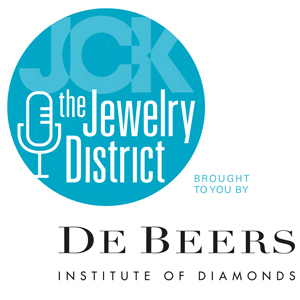
Join JCK editor-in-chief Victoria Gomelsky and news director Rob Bates for a roundup of buzzworthy industry updates. Victoria reports on the recent VicenzaOro fair, where the halls were crowded, the mood upbeat, and the looks big and bold. She updates listeners on a rare timepiece collection from the archives of Jaeger-LeCoultre. It’s the first significant effort by a Swiss watchmaker to sell vintage pieces and may herald a burgeoning trend. Rob analyzes what Israeli equipment maker Sarine’s purchase of the family-owned lab GCAL means for the future of diamond grading—and artificial intelligence’s growing role in it. Finally, the two discuss the Federal Trade Commission’s proposed ban on noncompete clauses.
Listen Now
Sponsored by De Beers: institute.debeers.com
Show Notes
2:22 A lively January VicenzaOro fair
7:21 Jaeger-LeCoultre unveils first vintage watch collection
12:22 What Sarine’s purchase of GCAL means for the future of diamond grading
18:09 The FTC’s move to ban noncompete clauses
Episode Credits
Hosts: Rob Bates and Victoria Gomelsky
Producer and engineer: Natalie Chomet
Plugs: @jckmagazine; institute.debeers.com
Show Recap
Viva VicenzaOro
Just back from Italy’s January VicenzaOro goldsmith and jewelry fair, Victoria says she was delighted to find the show packed and the mood optimistic. She had expected inflation, the war in Ukraine, and fear of recession to trigger cautiousness and a comedown from the boom the industry has enjoyed since the pandemic started. However, this was the best-attended VicenzaOro ever in terms of both exhibitors and attendees. Victoria spent most of her time in the crowded hall where Roberto Coin, Damiani, Fope, and other luxury brands that export to the United States were exhibiting. Also bustling was the adjacent T.Gold show, featuring jewelry machinery and technology for everything from engraving to laser welding.
Victoria is still amassing information on the show’s top sellers, but one trend is certain: Big, bold pieces are replacing the small, delicate ones favored during quarantine. Understated jewelry suited people well when they were working from home, she says, but now subtle looks (such as stacking multiple delicate bracelets on the wrist) are making way for powerful statement pieces—especially cuffs and collar necklaces.
Jaeger-LeCoultre Unveils Vintage Collection
Victoria’s recent European trip included a visit to Geneva to learn about Jaeger-LeCoultre’s first-ever vintage watch collection. She explains that the Swiss company is known as the watchmaker’s watchmaker. The brand has made all of its timepieces in its own workshops in the Vallée de Joux since its foundation in 1833, and Jaeger-LeCoultre calibers and movements have powered many other brands’ watches over the years. Now Jaeger-LeCoultre has mined its own rich history to create The Collectibles, 17 models from its archives produced between 1925 and 1974. Each reflects a watchmaking innovation from the 20th century. Twelve of these models were sourced from auction houses and vintage dealers and are available for purchase. Included are the Reverso, the company’s best-known model, and several interesting watches from the 1950s and 1960s, according to Victoria. The Collectibles is an evolving collection, so the models will remain the same, but different editions may be introduced along with new capsules, she says.
This is the first time Victoria has seen a Swiss watchmaker invest such effort into selling vintage pieces rather than new models. She likens it to Rolex’s Certified Pre-Owned program and points out the advantage of having such treasures returned to the workshops where they were created to be fine-tuned with the very tools and components that were used to build them. How will other brands respond? Victoria is eager to find out. She predicts that we’re on the brink of a new era of modern-day Swiss watchmakers taking much more care with vintage pieces that have potential to be resold.
Sarine Acquires GCAL
In other news, Rob reports that Israeli equipment manufacturer Sarine has bought the family-owned diamond-grading lab Gem & Certification Assurance Lab (GCAL). Though GCAL is relatively small, it is widely respected for giving tough grades based on GIA standards and offering a certificate guaranteeing those grades.
Rob finds the acquisition intriguing, given that Sarine uses machines that rely on artificial intelligence (AI) to grade diamonds. This allows them to grade gemstones in the factory rather than sending them to a lab, as Rob reported last year. The fact that Sarine is using a well-established lab to roll out its AI approach and promising to honor GCAL’s grading guarantee shows how much confidence they have in the technology, he says. Clearly, Sarine believes its technology can match GCAL’s standards. Rob and Victoria say the acquisition will help the industry get used to the concept of AI grading, a method many labs are exploring. How will AI play out in the industry? That’s anyone’s guess, but Victoria predicts it will become increasingly important throughout the supply chain.
Rob also notes that International Gemological Institute (IGI), a well-known and profitable appraisal lab focused on lab-grown diamonds, has been put up for sale by its owner, the Fosun Group. He and Victoria are interested to see who purchases it.
The FTC Moves to End Noncompete Clauses
Victoria mentions a recently proposed rule by the Federal Trade Commission to ban employers from issuing noncompete clauses. Rob explains that many workers miss clauses hidden in the fine print of employment contracts and find themselves hamstrung when they lose or quit a job and want to find new employment in their chosen field. For CEOs at high-profile companies, noncompetes might make sense, he says, but for the average person, they’re problematic—and widespread: Data suggests that one in five American workers is subject to a noncompete clause.
Despite objections from business groups and possible court challenges, the FTC rule could be enacted before year’s end, phasing out existing noncompete clauses and prohibiting new ones. If so, Rob envisions sweeping changes in the economy.
- Subscribe to the JCK News Daily
- Subscribe to the JCK Special Report
- Follow JCK on Instagram: @jckmagazine
- Follow JCK on X: @jckmagazine
- Follow JCK on Facebook: @jckmagazine






